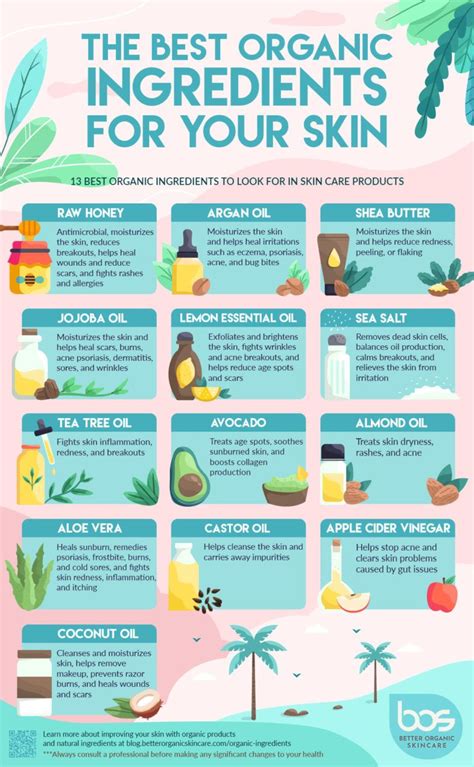The Power of Aloe Vera for Skin
Aloe vera is a succulent plant that has been used for centuries for its medicinal properties. It is not only known for its soothing and healing properties but also for its incredible benefits for the skin. Aloe vera contains a rich combination of vitamins, minerals, and antioxidants that can nourish and rejuvenate the skin.
One of the key benefits of aloe vera for skin is its ability to moisturize and hydrate. It has a gel-like consistency that can easily penetrate the skin, providing much-needed hydration without leaving a greasy residue. This makes it an excellent natural alternative to moisturizers, especially for those with dry or sensitive skin.
In addition to its moisturizing properties, aloe vera also has anti-inflammatory effects. It can help calm irritated skin, reduce redness, and even soothe sunburns. The soothing properties of aloe vera can also help alleviate common skin conditions such as eczema, psoriasis, and acne.
Furthermore, aloe vera is rich in antioxidants that can help fight free radicals and protect the skin from damage caused by environmental factors such as pollution and UV radiation. This can help slow down the aging process and reduce the appearance of wrinkles, fine lines, and dark spots.
In summary, aloe vera is a powerful ingredient for skin health. Its moisturizing, soothing, and rejuvenating properties make it a must-have in any skincare routine. Whether you have dry, irritated, or aging skin, incorporating aloe vera into your skincare regimen can provide numerous benefits and help you achieve a healthy and glowing complexion.
The Benefits of Coconut Oil for Skin
Coconut oil has gained popularity in recent years for its numerous benefits for the skin. It is loaded with healthy fats, vitamins, and antioxidants that can nourish and protect the skin. From moisturizing dry skin to soothing irritation, coconut oil offers a range of benefits that can improve the overall health and appearance of your skin.
One of the key benefits of coconut oil for the skin is its moisturizing properties. The high levels of saturated fats in coconut oil help to seal in moisture, keeping your skin hydrated and preventing moisture loss. Applying coconut oil to your skin can leave it feeling soft, smooth, and supple. It is particularly beneficial for those with dry or dehydrated skin, as it provides intense hydration and helps to restore the skin’s natural moisture barrier.
Not only does coconut oil moisturize the skin, but it also has anti-inflammatory properties that can help soothe various skin conditions. Whether you are dealing with eczema, psoriasis, or dermatitis, applying coconut oil can provide relief from itching, redness, and inflammation. The lauric acid present in coconut oil possesses antimicrobial properties that can also help treat acne and prevent infection.
- Coconut oil contains antioxidants that can combat the signs of aging. It helps to neutralize free radicals and reduce oxidative stress, which can contribute to premature aging of the skin. Regular use of coconut oil can help minimize the appearance of fine lines, wrinkles, and age spots, giving you a more youthful and radiant complexion.
- In addition to its cosmetic benefits, coconut oil can also be used as a natural sunscreen. While it does not provide the same level of sun protection as commercial sunscreens, coconut oil can offer some protection against harmful UV rays. It has an SPF of around 4-10, which makes it suitable for short periods of sun exposure.
- If you have sensitive skin, coconut oil can be a gentle and natural alternative to traditional skincare products. It is free from harsh chemicals and additives that can irritate the skin. However, it is important to do a patch test before applying coconut oil to your face or body to ensure that you do not have any allergic reactions.
Overall, coconut oil is a versatile and beneficial ingredient for skincare. Its moisturizing, anti-inflammatory, and anti-aging properties make it a great addition to your skincare routine. Whether you use it as a moisturizer, cleanser, or even as a hair treatment, coconut oil can do wonders for your skin. So why not give it a try and experience the amazing benefits of coconut oil for yourself?
| Benefits of Coconut Oil for Skin |
|---|
| Moisturizes dry skin |
| Soothes irritation and inflammation |
| Combats signs of aging |
| Provides natural sun protection |
| Gentle and suitable for sensitive skin |
Why Turmeric is Great for Your Skin
Turmeric, a spice commonly used in Asian cuisine, has recently gained popularity in the world of skincare. This vibrant yellow spice, known for its numerous health benefits, has been found to be great for your skin as well. Its active compound, curcumin, has powerful antioxidant and anti-inflammatory properties that can significantly improve the health and appearance of your skin.
One of the key benefits of turmeric for skin is its ability to combat acne and reduce the appearance of blemishes. The antibacterial properties of curcumin help fight against the bacteria that often contribute to acne breakouts. Additionally, its anti-inflammatory effects can calm the skin, reduce redness, and promote faster healing of existing acne scars.
Furthermore, turmeric can also help brighten your skin and even out your complexion. It inhibits the production of excess melanin, which can lead to dark spots and uneven skin tone. Regular use of turmeric in skincare can result in a more radiant and youthful-looking complexion.
- Turmeric has potent antioxidant properties, which protect the skin from damage caused by free radicals. Free radicals are unstable molecules that can damage skin cells and accelerate the aging process. By neutralizing these free radicals, turmeric helps prevent the formation of wrinkles, fine lines, and other signs of premature aging.
- In addition to its antioxidant properties, turmeric also stimulates collagen production. Collagen is a protein that provides structure and elasticity to the skin. As we age, our natural collagen production decreases, leading to sagging and wrinkling of the skin. By promoting collagen synthesis, turmeric helps maintain skin firmness and elasticity, resulting in a smoother and more youthful appearance.
- Aside from its topical benefits, consuming turmeric orally can also have positive effects on your skin. Its anti-inflammatory properties work internally as well, reducing inflammation throughout the body, including the skin. This can help alleviate conditions such as eczema, psoriasis, and rosacea.
| Benefits of Turmeric for Skin |
|---|
| Reduces acne and blemishes |
| Brightens skin and evens out complexion |
| Protects against premature aging |
| Stimulates collagen production |
| Alleviates skin inflammation |
Incorporating turmeric into your skincare routine is relatively easy. You can make a homemade face mask by mixing turmeric powder with a natural ingredient such as yogurt or honey. Apply the mixture to your face, leave it on for 10-15 minutes, and then rinse off with warm water. Be cautious, as turmeric can stain the skin temporarily, especially if applied in high concentrations. It is recommended to perform a patch test before using turmeric topically and to use sunscreen afterwards, as it can make your skin more sensitive to the sun.
In conclusion, turmeric is a fantastic addition to your skincare routine, thanks to its powerful antioxidant, anti-inflammatory, and collagen-boosting properties. Whether used topically or consumed orally, this golden spice can work wonders for your skin, leaving it clear, bright, and youthful. So why not harness the power of turmeric and embrace the benefits it has to offer for your skin?
How Rosehip Oil Nourishes and Rejuvenates
Rosehip oil has gained popularity in recent years for its numerous benefits for the skin. Derived from the seeds of the rosehip fruit, this natural oil is rich in essential fatty acids and antioxidants, making it a powerful ingredient for nourishing and rejuvenating the skin.
One of the key properties of rosehip oil is its ability to deeply moisturize the skin. It contains high levels of linoleic acid, an omega-6 fatty acid, which helps to strengthen the skin’s barrier and lock in moisture. This makes it particularly beneficial for those with dry or dehydrated skin, as it can help to alleviate dryness and improve overall skin texture.
In addition to its moisturizing properties, rosehip oil is also known for its anti-aging effects. It is packed with antioxidants, such as vitamin C and vitamin A, which can help to protect the skin from environmental damage and stimulate collagen production. This can result in a reduction of fine lines and wrinkles, as well as an improvement in overall skin firmness and elasticity.
- Nourishes the skin: Rosehip oil is deeply moisturizing and helps to alleviate dryness.
- Rejuvenates the skin: The antioxidants in rosehip oil help to stimulate collagen production and reduce signs of aging.
- Improves skin texture: Regular use of rosehip oil can lead to smoother and more even-looking skin.
- Reduces hyperpigmentation: The vitamin A in rosehip oil can help to fade dark spots and improve overall skin tone.
| Key Benefits of Rosehip Oil: |
|---|
| Deeply moisturizes the skin |
| Stimulates collagen production |
| Reduces signs of aging |
| Improves skin texture and tone |
In conclusion, rosehip oil is a powerhouse ingredient that can nourish and rejuvenate the skin. Its moisturizing and anti-aging properties make it a suitable choice for those looking to improve their skin’s texture and appearance. Whether used alone or as part of a skincare routine, rosehip oil offers a natural and effective solution for achieving healthier, more youthful-looking skin.
The Skin-loving Properties of Green Tea
Green tea is not only a popular beverage, but it also has numerous skin-loving properties that can greatly benefit your complexion. Packed with antioxidants and nutrients, green tea has been used for centuries in traditional medicine and skincare rituals. In this blog post, we will explore the amazing benefits of green tea for your skin and why you should incorporate it into your skincare routine.
First and foremost, green tea is rich in antioxidants. Antioxidants help to neutralize free radicals in the body, which are known to cause damage to our cells and accelerate the aging process. By including green tea in your skincare routine, you can effectively combat these free radicals and protect your skin from premature aging. The antioxidant properties of green tea also help to reduce inflammation, calm redness, and soothe irritated skin.
Another great benefit of green tea is its anti-aging properties. Green tea contains a powerful antioxidant called epigallocatechin gallate (EGCG) which has been shown to promote the production of collagen in the skin. Collagen is a protein that keeps our skin firm and supple. As we age, our collagen levels naturally decrease, leading to the formation of wrinkles and sagging skin. By boosting collagen production, green tea can help to reduce the signs of aging, leaving you with a more youthful complexion.
In addition to its anti-aging benefits, green tea also has anti-inflammatory properties that can help to calm and soothe the skin. Whether you have acne-prone skin or suffer from conditions such as rosacea or eczema, green tea can help to reduce redness, inflammation, and irritation. The catechins found in green tea are known for their antibacterial properties, making it an excellent natural remedy for acne. Applying green tea to your skin can help to unclog pores, reduce oil production, and prevent breakouts.
Now, let’s dive into the various ways you can incorporate green tea into your skincare routine. One simple and effective method is to use green tea as a facial toner. Simply steep a green tea bag in hot water, allow it to cool, and then apply it to your face with a cotton pad. This will not only remove any remaining dirt or impurities from your skin but also provide it with a boost of antioxidants and hydration. You can also create a soothing green tea face mask by mixing cooled green tea with honey and applying it to your skin for 15-20 minutes. This mask will help to hydrate, detoxify, and brighten your complexion.
In conclusion, green tea is not only a delicious and refreshing beverage but also a powerful ally for your skin. Its antioxidant, anti-aging, and anti-inflammatory properties make it a valuable addition to any skincare routine. Whether you choose to apply it topically or consume it orally, green tea can help to improve the overall health and appearance of your skin. So why not sip on a cup of green tea while enjoying its wonderful benefits for your skin?
Frequently Asked Questions
Question: What are the benefits of aloe vera for the skin?
Aloe vera has numerous benefits for the skin. It soothes and moisturizes the skin, helps in healing wounds and sunburns, reduces acne and blemishes, and slows down the aging process by improving collagen production.
Question: How can coconut oil benefit the skin?
Coconut oil is highly beneficial for the skin. It moisturizes and nourishes the skin, possesses antimicrobial properties, reduces inflammation, helps in treating eczema and psoriasis, and acts as a natural sunscreen.
Question: What makes turmeric great for the skin?
Turmeric is great for the skin due to its anti-inflammatory and antioxidant properties. It helps in reducing acne and scarring, calms down redness and irritation, brightens the skin, and provides a natural glow.
Question: How does rosehip oil nourish and rejuvenate the skin?
Rosehip oil nourishes and rejuvenates the skin by moisturizing deeply, promoting collagen production, reducing fine lines and wrinkles, fading scars and hyperpigmentation, and protecting against sun damage due to its high vitamin C content.
Question: What are the skin-loving properties of green tea?
Green tea is packed with antioxidants that protect the skin from free radicals and environmental damage. It reduces inflammation, treats acne, improves skin complexion, and rejuvenates the skin by promoting cell regeneration.





